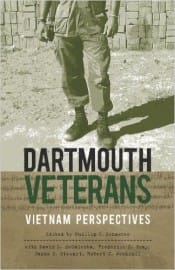Experience of a Generation December 4, 2015
Wars have many causes, including egotistical dictators, insufficient agricultural land for an overpopulated country, securing access to natural resources, assumed supremacy and, in the case of the Vietnam War, fear. The United States feared communist expansion in Southeast Asia, after having halted communists in Korea and Eastern Europe. That fear was based on a theory that communism would overtake all of Southeast Asia starting with the conquest of Vietnam. In the early 1960’s there was little awareness of the USA’s very limited involvement in Vietnam. In fact there was little understanding of the country of Vietnam or its neighbors.

Dartmouth College
Hanover, New Hampshire is the home to Dartmouth College, one of the eight members of the prestigious Ivy League (Brown, Columbia, Cornell, Dartmouth, Harvard, University of Pennsylvania, Princeton, Yale). In September 1960, 806 men, including one from the Netherlands, started their careers at Dartmouth. Almost one-quarter joined ROTC (Reserve Officers Training Corps), which is a program designed to educate young men (and now young women) to become military officers. By June 1964 when they graduated, Vietnam was still not on their radar screens, though it was soon thereafter.
Many of these young, patriotic, freshly minted college graduates continued their educations to become engineers, lawyers and doctors. The remainder of the ROTC officers joined their branch of the military and received specialized training. It was then that they first learned where Vietnam was located, twelve time zones from Hanover, New Hampshire. Three or four years later, when the war had grown to a size big enough to topple a presidential contender (Johnson), those lawyers, doctors and engineers were called to service.
Almost 50 years later, this class secretary (Dartmouth Class of 1964) initiated a project to shed some light on the experiences of his classmate-veterans, who had been in battle, support positions in Vietnam, or were stationed in the USA or other countries – wherever the U.S. military was on duty to protect our perceived national interests. Of the 155 living veterans, 55 agreed to write essays about how their experiences affected their lives. Almost all the authors were supportive of the war when they entered service; most changed their views by the time they concluded their tours of duty. They learned many lessons, which subsequently served them well. However, they also suffered many wounds, physical and psychological. Some of the authors had never spoken about their experiences in the ensuing years. Some of their fellow veterans still cannot talk about their experiences.

The collection of essays was assembled into a book, Dartmouth Veterans – Vietnam Perspectives. Copies were sent to all 600+ living members of the Dartmouth Class of 1964. The Class donates copies of Dartmouth Veterans to all the current Dartmouth students who study the history of the Vietnam War, taught by Professor Edward Miller. We also assemble a panel of Vietnam Vets from our class to share their experiences with Professor Miller’s students. We are gratified that you are interested in reading the abbreviated essays that the John Adams Institute is posting to its website.
Should you be interested in reading Dartmouth Veterans, it is available at on-line booksellers either printed or in electronic form. One classmate summed up his evaluation this way, “It’s an astonishing portrait of our class, really our entire generation.”
Peace,
Phillip C. Schaefer
Editor, Dartmouth Veterans – Vietnam Perspectives
Also read JAI director Tracy Metz’s introduction (December 2), editor Phillip C. Schaefer’s introduction (December 4), the essay by veteran Jim Harris (December 7), the essay by veteran Glen Kendall (December 9), the essay by Karl F. Winkler (December 14), the essay by George J. Fesus (December 16), the essay by veteran Carl DuRei (December 18), the essay by James Laughlin (December 21), the essay by John T. Lane (December 23), and the essay by Bud McGrath (December 27).